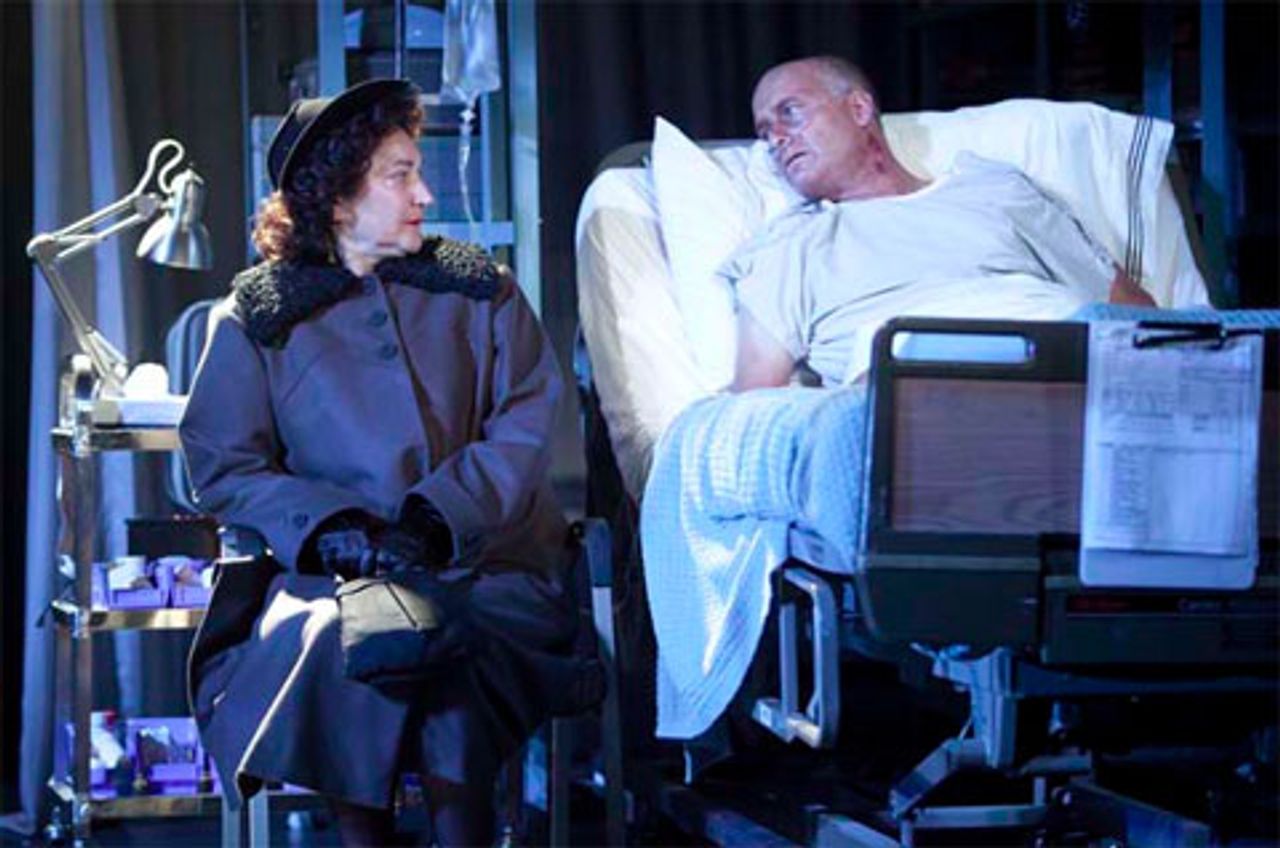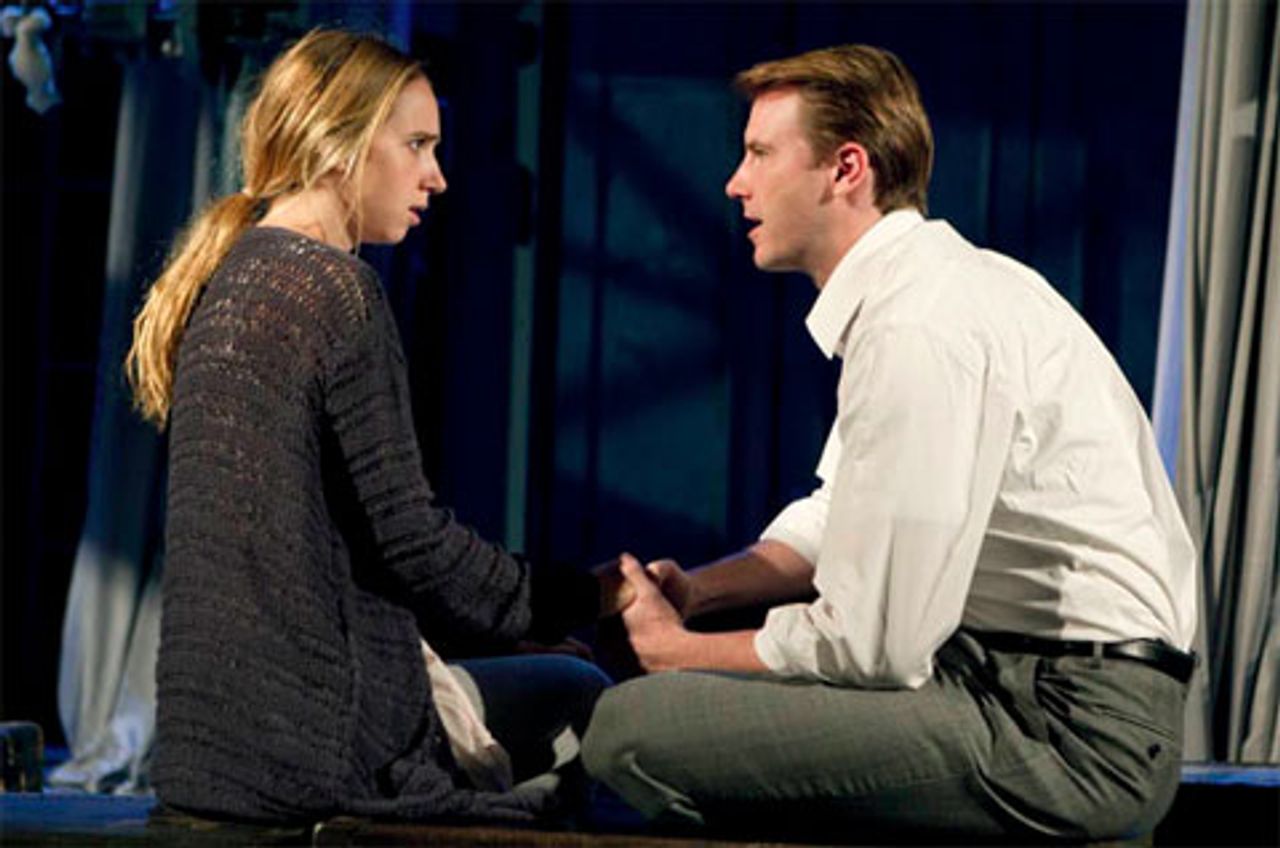Angels in America, a Gay Fantasia on National Themes presented by the Signature Theater Company. Written by Tony Kushner, directed by Michael Greif.
 The ghost of Ethel Rosenberg (Robin Bartlett) and Roy Cohn (Frank Wood) [Photo by Joan Marcus]
The ghost of Ethel Rosenberg (Robin Bartlett) and Roy Cohn (Frank Wood) [Photo by Joan Marcus]The Signature Theater revival of Tony Kushner’s Angels in America: A Gay Fantasia on National Themes brings this well-known play back to the New York stage to mark the 20th year of the theater, as well as the 25th anniversary of the year in which the drama takes place.
Kushner (born 1956) is perhaps better known to a wide audience these days for co-writing the screenplay for Munich (directed by Steven Spielberg, 2005). He has also translated plays by Bertolt Brecht, adapted Brundibar (the children’s opera by Jewish Czech composer Hans Krása, originally performed in the Theresienstadt concentration camp) into a picture book--with illustrations by Maurice Sendak—and written several other plays and books. He worked closely with the new cast of Angels in America and director Michael Greif, rewriting and reworking the script.
Angels in America, written as two plays, Millennium Approaches and Perestroika, is a lengthy and involved work, running over seven hours and presented at the Signature in two separate performances.
In the mid-to-late 1980s numerous playwrights tackled the AIDS epidemic, including William Hoffman in As Is (1985) and Harvey Fierstein in Safe Sex (1987). Angels in America, however, which opened on Broadway in 1993, made the most serious attempt to present the AIDS crisis in a wider context, both artistically and politically. Commentators termed the piece a wake-up call, which demanded that American society recognize the dimensions of the AIDS epidemic devastating the gay community and acknowledge it as a tragedy affecting the entire society, not just homosexuals.
In reviewing Angels in America it is necessary to distinguish between Kushner’s engaging and highly intelligent literary contribution, on the one hand, and his left-leaning, but deeply confused political outlook, on the other.
The script is poetic, tightly crafted and intricate, with recurring images, repeated phrases spoken by different characters, and characters intersecting through dreams or hallucinations in surprising ways. It is often funny, and very moving in parts, peeling away some of the layers of self-defense human beings employ in intense relationships.
The play is set in New York City (and other locales) in the late fall and winter of 1985-86. Ronald Reagan is in his second term as president of the United States. Thousands of gay men have died of AIDS. Scientists have recently discovered the hole in the ozone layer. The Iran-Iraq war has raged for five years. In the grim context that Kushner establishes, his characters respond to the atmosphere of crisis with their own internal struggles and grope for a way out.
The primary plot follows two couples, gay couple Prior Walter (Christian Borle) and Louis Ironson (Zachary Quinto), and the straight, Mormon couple Joe Pitt (Bill Heck) and his Valium-addicted wife, Harper (Zoe Kazan). When Prior reveals he has AIDS, Louis cannot handle the situation and abandons Prior. As Joe Pitt gradually comes to terms with his well-closeted homosexuality, he abandons Harper, whose reality lies in her hallucinations. Joe’s rigid Mormon mother (Robin Bartlett) abandons Salt Lake City to take control of her son’s sinful trajectory and rescue Harper from madness.
 Harper (Zoe Kazan) and Joe (Bill Heck) [Photo by Joan Marcus]
Harper (Zoe Kazan) and Joe (Bill Heck) [Photo by Joan Marcus]Joe, a lawyer and a Republican, works in the office of the notorious Roy Cohn (Frank Wood), the ambitious, unscrupulous right-wing lawyer and vicious anti-communist who had been chief counsel to Senator Joseph McCarthy. Cohn played a major role in overseeing the execution of Julius and Ethel Rosenberg in 1953 as Soviet spies. In Kushner’s play, the ghost of Ethel Rosenberg appears to Cohn intermittently, refusing him forgiveness.
The Cohn character publicly scorns homosexuals as weak and ineffectual, who “have zero clout,” even as he is dying of AIDS (which the real Cohn insisted until his death, was liver cancer). Louis works in the same court building as Joe Pitt. He first encounters the latter in an emotional scene in a public restroom, identifying Joe as gay when he responds sympathetically to Louis’ weeping.
The entire cast is connected, disconnected and reconnected throughout the course of the two plays. The set is simple, but manages to represent numerous locales: Cohn’s office and townhouse, Joe and Harper’s apartment, Louis and Prior’s apartment, New York’s Central Park, hospital rooms, the Mormon Visitors’ Center, Utah, along with Antarctica and … Heaven. The production also makes good use of rear-projection imagery to establish place and atmosphere. The eight actors collectively play more than 30 roles, with female actors playing several male roles to emphasize Kushner’s view of gender flexibility.
Following the funeral of Louis’ grandmother, Prior reveals his Kaposi’s Sarcoma lesion, a symptom of AIDS. (“I’m a lesionnaire. The Foreign Lesion. The American Lesion. Lesionnaire’s disease … My troubles are lesion.”) Reassuring Prior that he will come home after the burial, Louis consults with the rabbi on what the Scripture says about a person who “abandons someone he loves in a time of great need.” To which the rabbi reasonably responds, “Why would a person do such a thing?” Simultaneously, Joe and Harper’s dialog reveals that they are “Happy enough. Pretend-happy. That’s better than nothing.” These counterposed relationships unravel throughout Millennium Approaches.
This new production attempts to explore the more complex literary side of the text, and is less of a Gay Pride polemic than the original stage production, or the 2003 HBO mini-series (directed by Mike Nichols). The play raises a number of interwoven themes—abandonment, loyalty and love, individual change and universal transformation, religious dogma and personal revelation, social conformity and the rejection of stereotypes.
Kushner, who mentions Hegel in the text and credits Marx for his understanding of the social world (in the 1993 Theatre Communications Group edition of the play), has made a creditable effort to infuse the play with a historical and materialist outlook, albeit a confused one. The Angel (Robin Weigert), a heavenly visitor to Prior, is a very “earthly” character whose entrance is always anticipated by Prior’s sexual arousal. Kushner’s stage direction also indicates that the mechanical devices for the descent of the Angel (through Prior’s ceiling, falling plaster and all) should be obviously theatrical, with wires showing and stage hands unhooking her. In other words, angels are humanity’s creation. Heaven takes the form of San Francisco after the disaster of the 1906 earthquake.
What made Kushner’s play in the early 1990s stand out was the relative breadth of his perspective and socio-historical concerns. In the largely barren and banal theater and film world at the time, he addressed some important matters, including the conservatism, rigidity and greed of the Reagan-Bush years and the appalling influence of the religious right on American politics and society.
Moreover, there were few writers at the time willing to take on the legacy of the Russian Revolution, the McCarthyite witch-hunts, the break-up of the Soviet Union and the hypocrisy of US politicians and the elite. To a certain extent, the unusual dimensions of the play helped attract audiences and contributed to its success.
However, the limitations and amorphousness of the piece and the blunted character of its overall impact are bound up with the playwright’s liberal-humanist approach to those questions, which led him to unfortunate choices and conclusions, artistically as well as ideologically.
The second play, Perestroika, is the more didactic and less dramatically compelling. It opens with a lengthy monologue by “The World’s Oldest Living Bolshevik” (Bartlett) chastising “You who live in this Sour Little Age…” for being ill-equipped for Change, posing “The Great Question… Can we Change? In Time?” Kushner presents his Bolshevik as “unimaginably old and totally blind”—an artifact from an age for which Kushner is nostalgic, but from which he is unable to extract much contemporary meaning.
In any event, Kushner has not apparently worked through the events that have unfolded since he wrote the play. If one can excuse some of his illusions and wishful thinking at the time on the difficulties and traumas of the 1980s and 1990s, there is less justification in 2010.
For example, Louis, the leftist Jewish character, opens the play’s epilogue, set in 1990, with these lines: “The Berlin Wall has fallen, the Ceauçescus are out. He’s building socialism. The New Internationalism. Gorbachev is the greatest political thinker since Lenin.” One has to ask, why did Mr. Kushner, through all the rewriting, retain this line? What does he make of Gorbachev now?
In the years since he began work on Angels in America much has been transformed in the world, and the legacy of Gorbachev has proved to be anything but revolutionary. The playwright was one of those who misinterpreted glasnost and perestroika as the revival of socialism in the USSR, when, in fact, the Stalinist bureaucracy was moving toward restoring capitalism, with all its catastrophic consequences. A mea culpa is not necessary, but wouldn’t it have been a good idea for Kushner to reexamine the political conclusions he drew back in 1990 or so?
Angels in America is considerably more successful in providing insight into the contradictions of intimate relationships. Louis’ cowardice in the face of Prior’s illness and his self-centered attempt to receive Prior’s forgiveness is honest, and makes us uncomfortable in its rawness. The coldness of Joe’s mother, Hannah, a rigid Mormon, towards her son is also painfully direct. That the personal relationships reflect social tensions is embedded in the script and performances.
Kushner is an intelligent, sensitive writer capable of serious thinking and writing. It is possible to enjoy and appreciate this well-crafted production, but the play’s conclusion that change is inevitable (“The world only spins forward”), and that we should embrace it so we can all get along harmoniously, is simplistic and not terribly convincing.
Harper, in her final monologue as she heads for San Francisco, tells us, “Nothing’s lost forever. In this world, there is a kind of painful progress. Longing for what we’ve left behind, and dreaming ahead.” This sort of vague and contemplative “optimism” (which one might be bold enough to suggest conceals a good deal of skepticism about social life and change) is not very enlightening. If everything is simply going to ‘work out’ somehow in the fullness of time, then both strenuous artistic and political effort seem beside the point.
